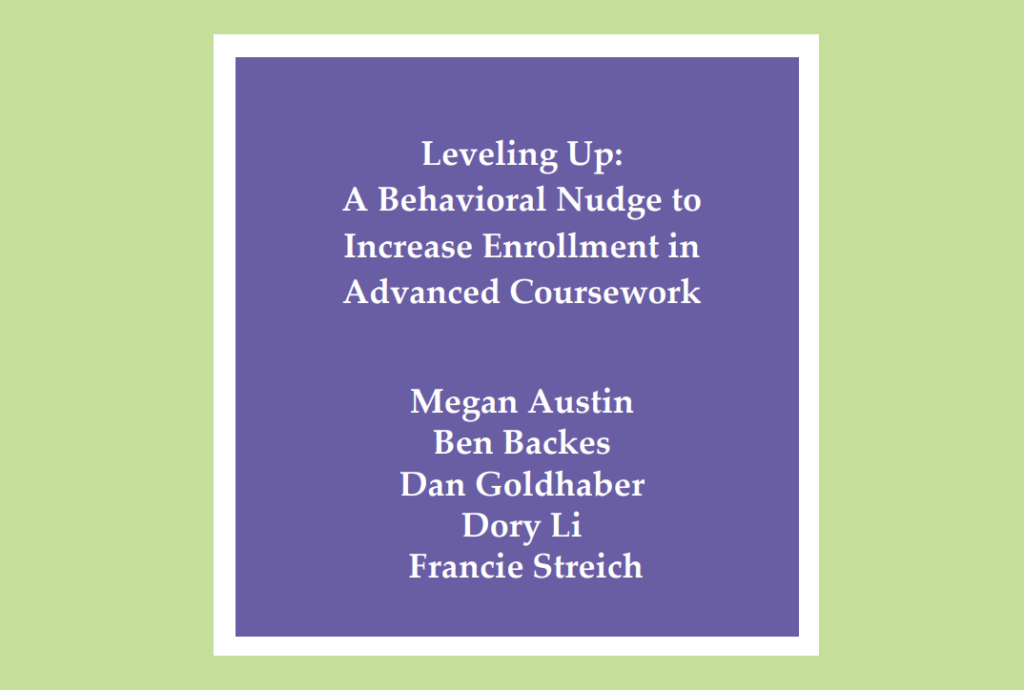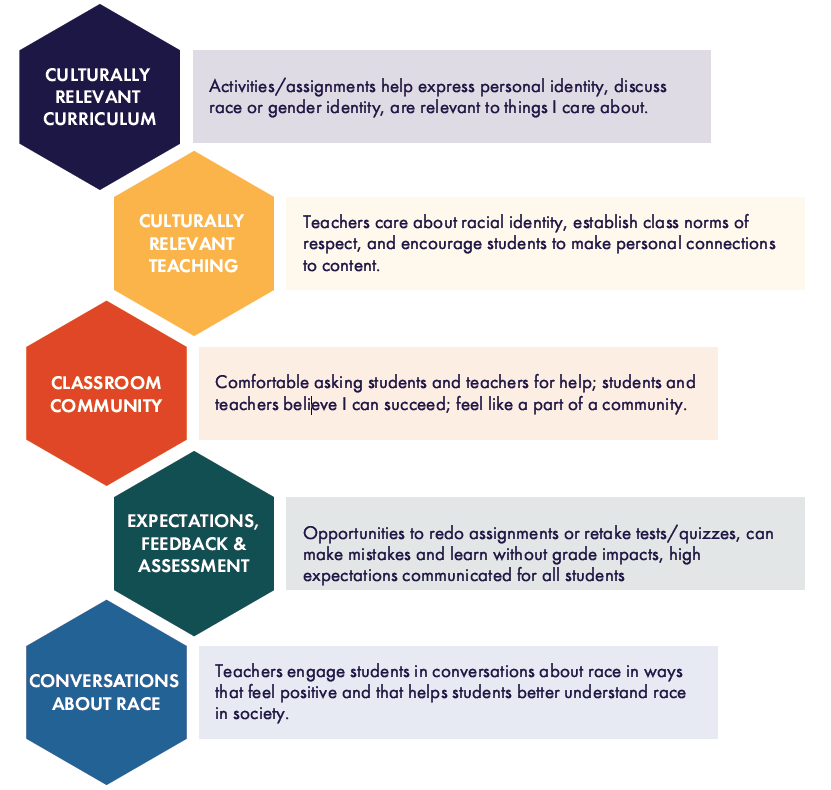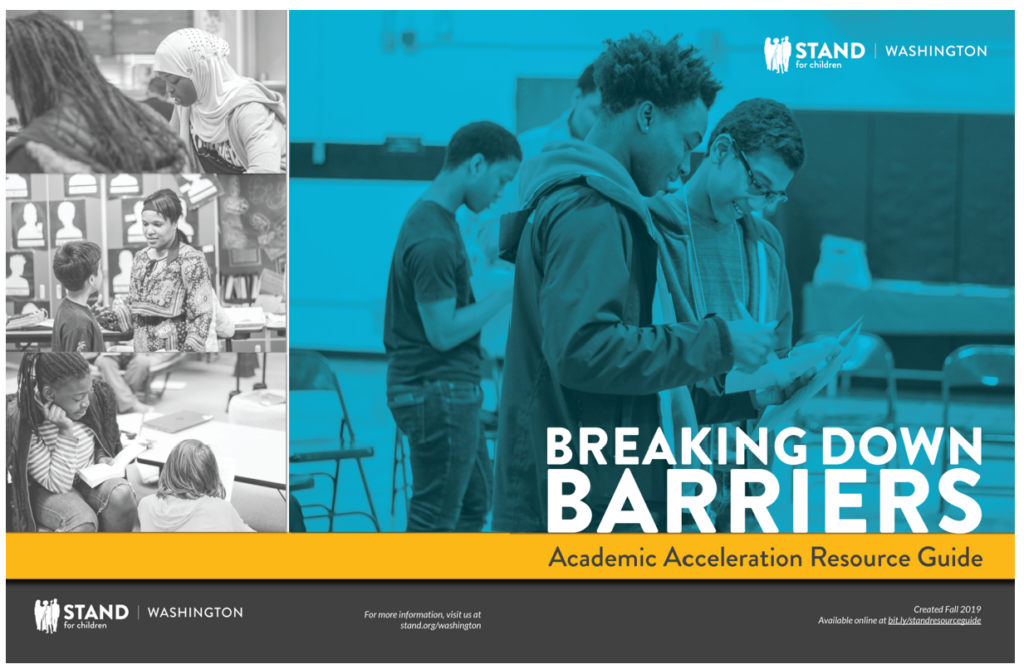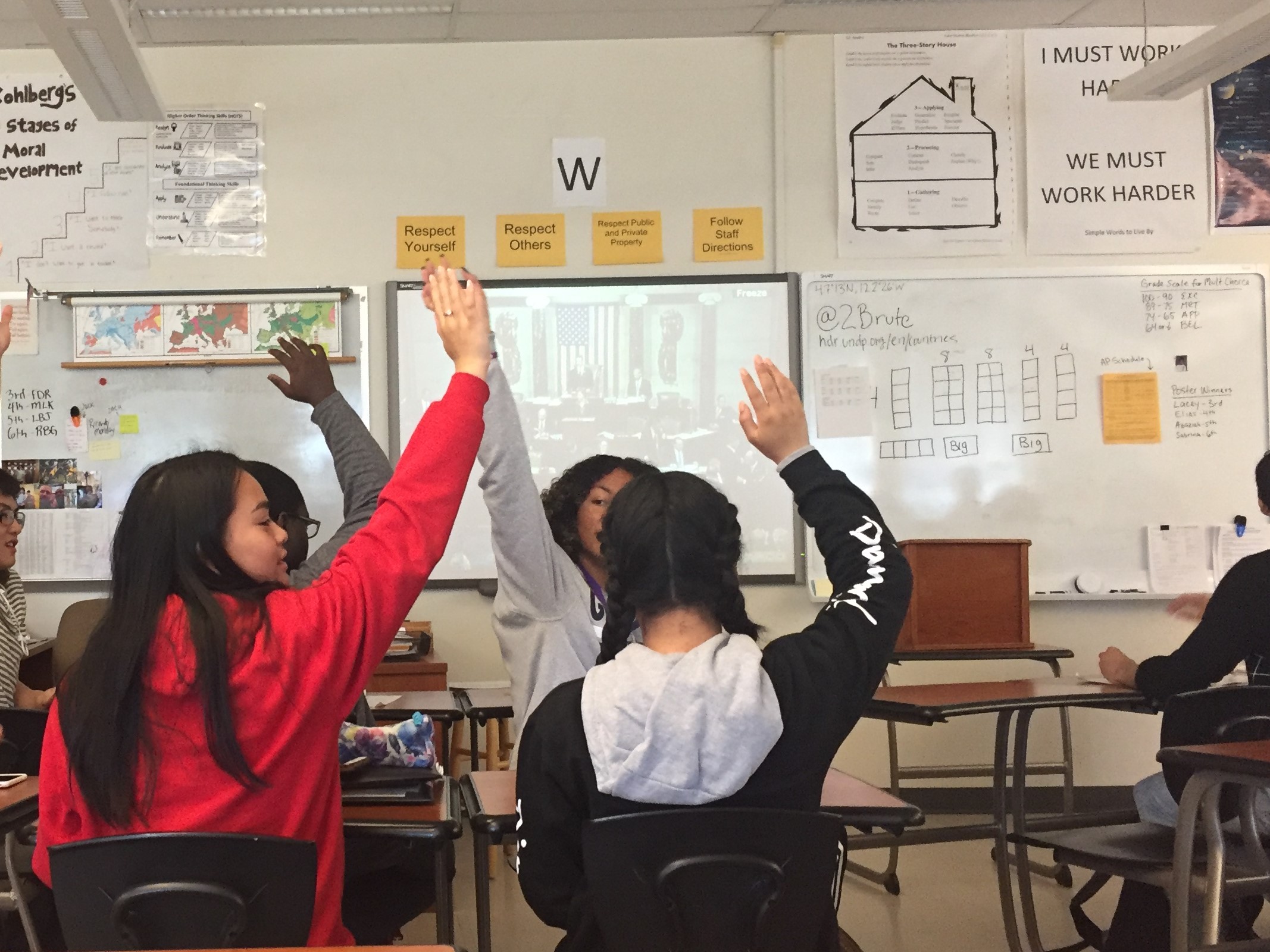
Building Belonging in Dual Credit Classrooms
A Report on the Implementation of Academic Acceleration Policies in Washington School Districts
January 2023 | Stand for Children Washington
Table of contents
Why We’re Here
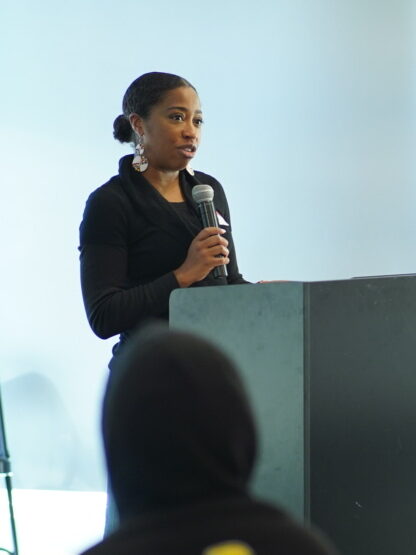
Welcome to our report documenting the accomplishments of Washington state educators who are Building Belonging in Dual Credit Classrooms. As the second in our Bridges to Dual Credit series, this report serves as a follow-up to our October 2021 report tracking the implementation of Academic Acceleration Policies in Washington school districts. Since that release, we are excited to announce that an additional 28 school districts across the state have fully adopted their own equitable dual credit policy, bringing our statewide total to 189 districts (over two-thirds of our goal!). We’re also pleased to have identified an additional 23 districts that are in the process of adopting an Academic Acceleration Policy. We are committed to providing resources to support them in the process.
Although one of our goals is to reach 100% adoption across every district and ensure the letter of the law is met, the spirit of the law means ensuring that these policies come alive for students and teachers. These policies are the bridges we’ve built together – our next step is to build a culture of belonging in dual credit classrooms and invite every student to join us there.
As we continue to monitor the state of policy adoption, the Stand for Children team is also supporting the implementation of this policy. In April of 2022, we hosted a two-part convening of educators from across the state who are excited about how to do this work and do it well. In the Spring of 2023, we will continue building networks, fostering connections, and learning and growing together to ensure that every Washington student has access to the rigorous coursework they’re asking for. On April 21st, we will host our virtual convening: Building Bridges to Dual Credit.
This report includes an updated list of districts that have adopted a policy alongside case studies showcasing the details of what effective implementation can look like. You’ll also find highlights from our district convenings, a brief history of how we got here, and an invitation to join us in the next phase of this movement. Thank you for joining us on this journey.
– Kia C. Franklin, Executive Director, Stand for Children Washington
A History of Dual Credit Equity in Washington
Stand shares the goal of equitable dual credit enrollment across all student groups with education organizations across Washington. In 2015, the Office of the State Superintendent of Public Instruction (OSPI) named Dual Credit Completion as one of three indicators of school effectiveness under the Every Student Succeeds Act (ESSA). Additionally, the State Board of Education and the Washington Student Achievement Council also feature dual credit prominently in their strategic plans. Students who take dual credit courses are more likely to graduate high school on time, enroll in a post-secondary program, and persist in that program. If we are going to address the ways in which systemic racism manifests within school walls, we must include an assessment of which students are in the most advanced courses and why.
The policy known as Academic Acceleration addresses logistical and human barriers to dual credit classes that students of color and marginalized students frequently face by automatically opting in a wider net of qualified students to the next most rigorous course available in their school. Academic Acceleration began in 2011 in Federal Way, Washington, and showed early promising results. In 2013, the Washington State Legislature passed HB 1642, a law encouraging districts to adopt an Academic Acceleration policy.
Recognizing the capacity needed to enroll an increased number of students in advanced courses, the 2013 law created a competitive and incentive grant program to cover costs such as teacher training, technology, transportation, books, and fees. The Academic Acceleration Incentive program offers competitive grant funding to grow dual credit offerings for students; districts are required to adopt an Academic Acceleration policy prior to receiving an award. It also allocates additional incentive funding to high schools based on the successful participation of students in dual credit programs (except Running Start) the previous year.
Finally, the law also directed the state education agency to report on annual passing rates for Advanced Placement, International Baccalaureate, and Cambridge exams, and rates of students earning college credit through College in the High School, CTE Dual Credit, and Running Start programs. These data are available on the Washington State Report Card.
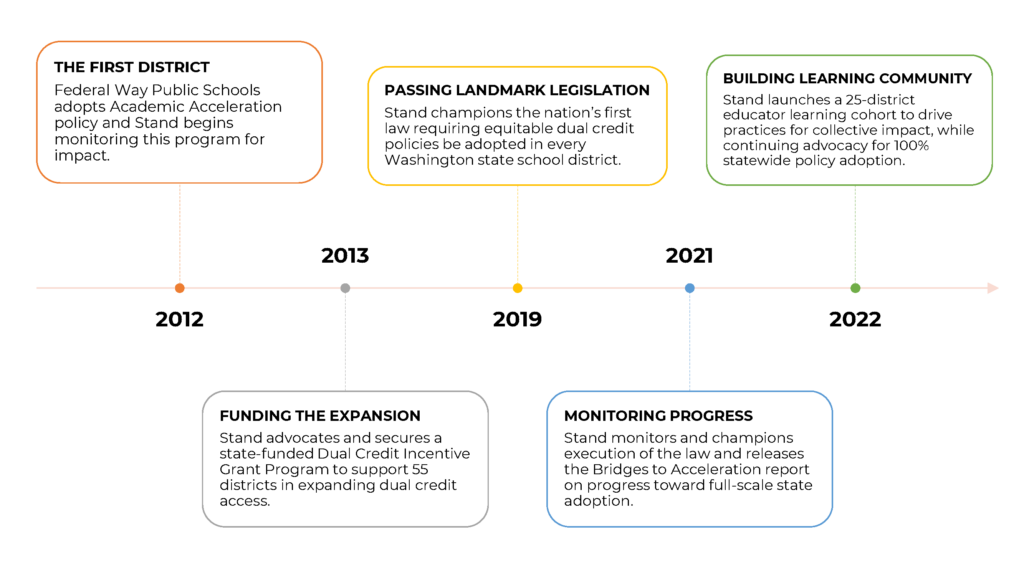
Between 2013 and 2019, over fifty districts across Washington state adopted an Academic Acceleration policy. Stand conducted an analysis of enrollment data and discovered that a majority improved the equity of advanced classes by enrolling more historically underserved students. With 1 in 6 school districts having implemented the policy already, and a growing knowledge of it as a helpful lever in increasing equity in dual credit enrollment, the 2019 legislative session provided a prime opportunity to advocate for taking Academic Acceleration statewide.
Coalition support played a critical role in passing Academic Acceleration as a statewide law; Stand for Children convened the Black Education Strategy Roundtable, College Success Foundation, Graduate Tacoma, Partnership for Learning, and Treehouse to form the High School Success Coalition. The Coalition’s primary goal is to ensure that all Washington students graduate from high school on time and prepared for college and career. The Coalition was able to garner broad support from legislators, constituents, and other advocates who had seen Academic Acceleration work to enroll more students in advanced courses. Components of the campaign included multiple advocacy days at the Capitol, op-eds in the Seattle Times and other Washington newspapers, and social media. The policy passed as part of HB 1599, which reworked the state’s graduation requirements into eight defined pathways.
After almost a decade of effort, Washington state was the first state in the country to adopt an automatic enrollment policy for advanced math, English, and science classes in all high schools. This report series by Stand for Children Washington documents the ongoing success of educators who are implementing the policy and impacting students across the state.
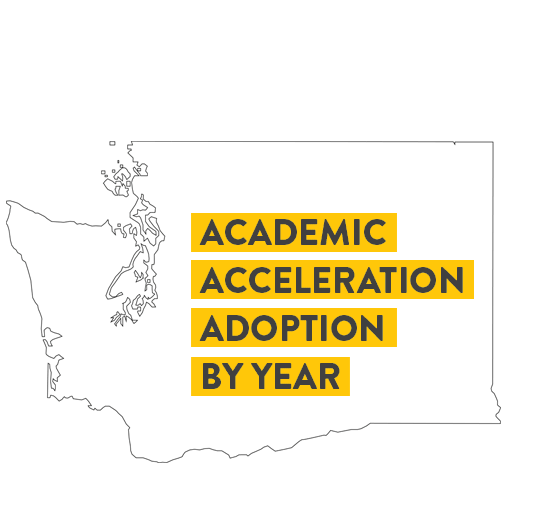
List of Districts with Adopted Policies
Since the publication of our October 2021 report, 29 more districts have adopted an Academic Acceleration policy as required by RCW 28A.320.195, bringing the total to 189 districts!
This page includes a list of those districts and links to existing policies where available. It is sorted first by Educational Service Districts and then in alphabetical order to serve as a resource for districts seeking local support on the implementation of their policy.
Is your district on this list? Do you know anyone you could reach out to in a neighboring district to learn more about their policy?
ESD 101 (Spokane)
ESD 105 (Yakima)
ESD 112 (Vancouver)
ESD 113 (Capitol Region – Tumwater)
ESD 114 (Olympic Region – Bremerton)
ESD 121 (Puget Sound Region – Renton)
ESD 123 (Pasco)
ESD 171 (Wenatchee)
ESD 189 (Anacortes)
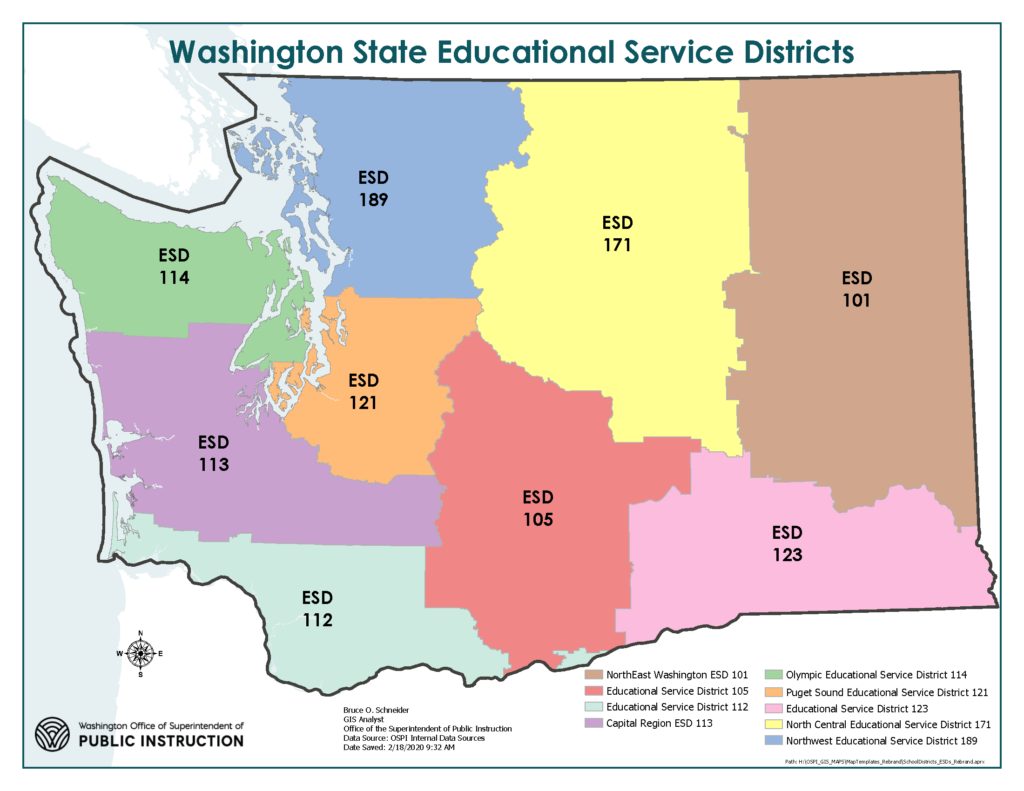
Case Study: Eisenhower HS in Yakima
In 2020, Gabe Stotz, College and Career Manager at Eisenhower High School in Yakima, became curious about the dual credit opportunities available to Eisenhower students. He and others had a strong hunch that the school’s dual credit courses were not equitably accessed by the large and diverse student population, but he didn’t have concrete data or information to identify enrollment and completion patterns for course offerings at Eisenhower.
Read the full case study about how Eisenhower HS built its equitable dual credit program here on Washington STEM’s website. Here are some insights about the value of dual credit classes and how educators can better support students:
“[A]ctually talk to us and build relationships with us. When you build relationships, you actually want to learn what they’re teaching. You actually want to know what they’re telling you because you respect them.”
—White, Female, 12th grader
“In dual credit the teachers hold you to a completely different standard than normal classes. It makes the class a lot more challenging when you’re striving for a goal.”
—Latinx/White, Male, 12th grader
Case Study: Bridgeport HS
In 2002, educators Scott Sattler and Tami Jackson set out with a vision that would dramatically change the culture of rural Bridgeport High School over the next two decades. At the time, Bridgeport was designated as one of the worst-performing districts in Washington state with some of the lowest student test scores. If they were going to find a new way forward, Tami and Scott believed that they must raise the bar for their students. So they began by offering their very first dual credit courses to any student who would take them.
Read the whole case study here to learn more about how Bridgeport implemented its equitable dual credit policies.
2022 Convenings Summary
In Spring of 2022, the Stand for Children Team partnered with Equal Opportunity Schools and Washington STEM to host a free, two-part workshop is for Washington educators and administrators who are excited about building equitable student access to dual credit courses. This opportunity was part of Washington’s statewide effort to enroll more underidentified students into advanced courses.
Bringing together this group of educators, students, and administrators is a critical step in building sustainable change in Washington education culture. By fostering connections and building relationships across districts, we can ensure that this work lives beyond one generation of educators and continue to impact students for years to come.
Would you like to join the next convening? Register today for our virtual convening on April 21st!

How do we really not look ourselves in the mirror and say, “Well, if we believe in family engagement, if we believe that every kid should be challenged at the highest level, then why don’t we create policy to ensure that those civil rights are implied?”
Josh Garcia, Superintendent, Tacoma Public Schools, Spring 2022 convenings
This virtual experience built in essential planning time for creating policies and practices, provided context about other districts’ approaches, and created connections between participants facing similar challenges.
During the convenings, we heard from students, educators, and administrators as we answered the following questions together:
- What are the top questions for educators to ask as they adopt or implement the new required Academic Acceleration policy for dual credit courses?
- What data-informed strategies can help schools enroll and support students of color and low-income students who’ve been under-identified for dual credit, so that they thrive in these courses?
- How can equitable dual credit course enrollment lead to transformational change for students and schools?

“A way in which students can feel like they belong is to also acknowledge their knowledge systems from their communities. You learn about biology, and it doesn’t have to be in a lab. It’s about touching dirt. It’s about being in those relationships with nature.
Henedina Tavares, WA STEM COmmunity Fellow, spring 2022 convenings
It’s about disrupting what that learning looks like – it doesn’t always happen in a classroom”
Watch this video summary of the convenings for a taste of the conversations we had, the questions we asked, and the connections we made together.
Join us April 21st
Interested in learning more about how your school district can join the movement to build belonging in dual-credit classrooms? Please join us April 21st!
This virtual convening on April 21st will be the gathering of a statewide learning cohort, rooted in racial equity and community design, to address the technical and adaptive challenges of ensuring students of color and low-income students are identified, enrolled, and affirmed in advanced courses. This cohort will connect district- and building-level education leaders with families and students. Participants will receive training and build peer networks centered on bringing antiracist practices into advanced course enrollment, to support the collective implementation of the 2019 Academic Acceleration law requiring Washington state school districts to adopt equity policies that automatically enroll students in advanced and/or dual credit courses.
Resources
Why Are Black and Latino Students Shut Out of AP STEM Courses?
A Report by Ed Trust
2 in 5 Black and Latino students say they really enjoy STEM (science, technology, engineering, and math) courses and aspire to go to college, but less than 3 percent are enrolling in STEM courses. Many aspiring young Black and Latino students across the nation who show a love for science early on and express an interest in pursuing it as a career, want to discover something new, to make a difference, and to help their families and their communities.
Leveling Up: A Behavioral Nudge to Increase Enrollment in Advanced Coursework
A Paper from the National Center for the Analysis of Longitudinal Data in Education Research
In this descriptive paper, we examine enrollment patterns by comparing districts that adopted the policy at different times. We found that students in districts that implemented the policy between 2014–15 and 2016–17 were more likely to enroll in at least one advanced course in any subject relative to students in districts without the policy. This was the case for students who “qualified” for advanced courses based on their test scores and for students whose scores did not qualify them for advanced courses.
The Cues and Conditions of Student Belonging
A Report from Equal Opportunity Schools
EOS collects data from students and schools through our proprietary Student and Staff survey instruments. Nearly 1.5 million students have taken our survey. In Fall 2018 and then again in Fall 2019, we piloted a set of survey questions designed to understand the conditions that led students of color enrolled in AP/IB classes to report a feeling of belonging. Through analysis of survey data from over 90,000 students of color enrolled in one or more AP/IB class and extensive focus groups with 114 students from diverse partner schools, we identified five leading indicators of belonging.
Breaking Down Barriers: Academic Acceleration Resource Guide
A 2019 Report from Stand for Children Washington
This resource guide was created in 2019 to provide an overview of the Academic Acceleration policy and its evolution in Washington. Its purpose is to support policymakers and advocates in other states fighting for similar policies to serve their students. Most importantly, it provides artifacts including a model policy, statute language, and campaign materials to support that advocacy.
Questions about this report, equitable dual credit policies, or our 2023 convenings? Email our team at [email protected].




